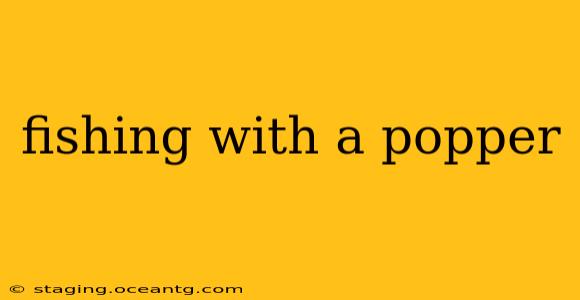Popper fishing offers an exciting and visually stimulating approach to angling. The erratic, splashing action of a popper lures fish from a distance, triggering aggressive strikes. This guide delves into the nuances of popper fishing, equipping you with the knowledge and techniques to enhance your success on the water.
What is a popper lure?
A popper is a topwater lure designed to create a distinctive popping sound and splashing action on the surface. Its unique design, typically featuring a cupped face and a weighted body, allows anglers to manipulate its movement, creating enticing disturbances that attract predatory fish like bass, tarpon, and snook. The key to success lies in understanding how to work the lure effectively.
How to use a popper lure?
The most effective popper fishing technique involves a series of short, sharp twitches of your rod tip, followed by brief pauses. This creates the characteristic popping sound and erratic movement that draws fish in. The pauses are crucial, as they allow the lure to settle briefly on the surface, mimicking a wounded baitfish.
Choosing the right popper
Selecting the appropriate popper depends on several factors, including the target species, water conditions, and fishing location. Larger poppers are ideal for targeting larger predatory fish in open water, while smaller poppers are more effective for shallower areas and smaller fish. Consider the color and design of the popper as well; some colors and patterns are more attractive to fish than others.
What kind of fish can you catch with a popper?
Poppers are remarkably versatile and can be used to catch a wide variety of fish. Some of the most common species caught on poppers include:
- Largemouth Bass: A highly popular target for popper fishing, largemouth bass are aggressively attracted to the commotion created by a popper.
- Smallmouth Bass: Similar to their largemouth cousins, smallmouth bass readily strike at surface lures like poppers.
- Pike: The aggressive nature of pike makes them prime candidates for popper fishing.
- Tarpon: Known for their acrobatic leaps, tarpon are a challenging but rewarding target species for experienced popper anglers.
- Snook: These hard-fighting fish are frequently found in shallow coastal waters and are highly responsive to poppers.
What is the best rod and reel for popper fishing?
The ideal setup for popper fishing generally involves a medium-heavy to heavy power rod with a fast action. This allows for precise casting and effective hook setting. A matching reel with a high gear ratio is also recommended for quick retrieval and effective lure manipulation. The specific rod and reel choice will depend on the size and type of popper being used, as well as the target species.
What are some tips for fishing with a popper?
Several techniques can enhance your success rate when fishing with a popper:
- Vary your retrieve: Experiment with different retrieves to determine what works best in specific conditions. Sometimes a slow, steady retrieve is effective, while other times a fast, erratic retrieve will trigger a strike.
- Pay attention to the surface: Watch for any signs of fish activity, such as surface disturbances or breaking water. This can indicate the presence of feeding fish and help you pinpoint productive areas.
- Use quality tackle: Investing in high-quality fishing tackle, including a strong rod, reliable reel, and sharp hooks, is essential for successfully landing larger fish.
- Practice your casting: Accurate casting is crucial for presenting the popper effectively to fish. Practice your casting technique to ensure you can consistently place the lure in the desired location.
How do you retrieve a popper?
The retrieve is what makes the popper effective. A proper retrieve involves short, sharp twitches of the rod tip, followed by brief pauses. This creates the popping sound and erratic movement that imitates a distressed baitfish. Experiment with the speed and intensity of your twitches and pauses to determine what works best in different situations. Don't be afraid to try a slow, steady retrieve occasionally to change things up.
What are good times to use a popper?
Poppers are most effective during periods of low light, such as dawn and dusk, when fish are more active on the surface. They can also be effective during overcast days or when the water is slightly choppy.
By mastering the art of popper fishing and understanding the nuances of lure selection, retrieve techniques, and timing, you can significantly improve your angling success. Remember to adapt your techniques to suit the specific conditions and target species. Tight lines!
